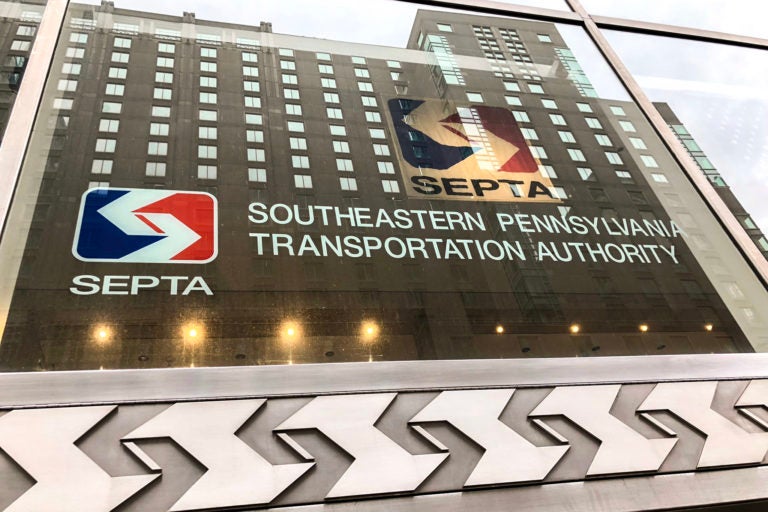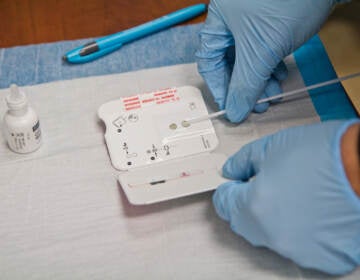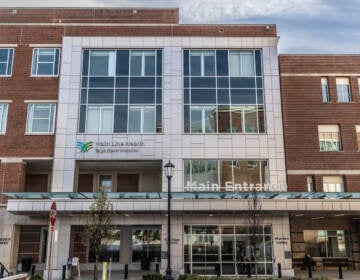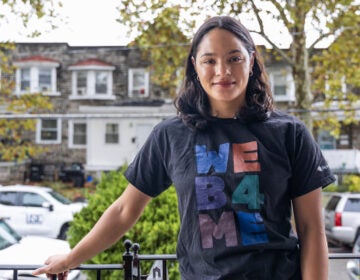SEPTA: Dire finances prevent agency from paying out COVID death benefits
The union that represents SEPTA workers fought for a $500,000 death benefit — a payout that New York’s MTA provided over the summer.

SEPTA headquarters (Danya Henninger/Billy Penn)
When Ted Nixon died of COVID-19 in March, the 63-year-old SEPTA mechanic left behind a hole in his family that’s impossible to fill.
Shy and reserved, but friendly, Nixon was the kind of guy his family could always rely on — for the big stuff and the small stuff.
For his wife, Brenda Smith Nixon, he recently installed light dimmers near the basement TV of their Sicklerville, New Jersey home to make movie-watching a more pleasant experience.
Nixon, who fixed SEPTA vehicles at the Elmwood Trolley Depot, loved to plan family vacations — like their cruise to Bermuda last summer. He loved collecting comic books and Star Trek memorabilia, and calling into talk radio shows to join the discussions.
Then there were the practical matters. Nixon’s salary was helping pay off his son’s student loans. Via his SEPTA job, he provided health care for his entire family. He split the responsibilities with Smith Nixon to take care of their daughter, Morgan, who has autism and is nonverbal.
“He’ll do anything for you,” Smith Nixon said. “He was a family person. He was a good father.”
Ted Nixon was the first SEPTA employee to die from COVID-19. The unexpected tragedy for Smith Nixon is compounded by the fact that SEPTA hasn’t offered any compensation for her husband’s loss beyond the standard benefits. The families of SEPTA employees who died from COVID-19 are eligible for:
- Their life insurance policy
- Half his pension, as soon as they reach age 65
- An accidental death insurance payout of $40,000

Subscribe to PlanPhilly
Both she and Transport Workers Union Local 234, the union that represented her husband and his SEPTA colleagues, think she deserves more. They allege the transit authority was partially responsible for her husband’s death. He likely contracted the virus at work, and SEPTA hadn’t yet provided enough PPE or hand sanitizer to workers, they argue.
TWU fought for a $500,000 death benefit — a payout that New York’s MTA provided over the summer — but SEPTA denied their request back in May, citing revenue concerns. SEPTA sustained a nearly 70% drop in ridership that lasted through the summer, and the state has threatened to yank even more vital funding.
“Due to the authority’s financial situation, particularly current and projected revenue losses due to ridership declines, SEPTA cannot provide this additional death benefit,” SEPTA spokesperson Andrew Busch said.
Instead, SEPTA set up a memorial fund in July with a $10,000 donation from the Philadelphia Foundation and the Delaware Valley Regional Economic Fund. The fund is now at $14,000. SEPTA is waiting on more contributions, Busch said, and the plan for distribution to families hasn’t been finalized yet.
Smith Nixon never expected a $500k payout, nor does she say she truly needs one. Instead, she thinks she deserves compensation in the ballpark of $100,000 — plus continued health care coverage.
“That’s key,” Smith Nixon said. “Teddy was the one taking care of our health benefits. I’m so used to our benefits coming through SEPTA. That was the thing that kind of upset me. It was a major change to us.”
A call for coronavirus-specific benefits
Nixon, who clocked more than 30 years at SEPTA, was among at least seven workers who died from COVID-19:
- Phil Williams: fueler, Southern Depot
24 years of service - Michael Holt: mechanic, Midvale Shop
21 years of service - Michael Hill: Regional Rail conductor
More than 30 years of service - Yolanda Woodberry: bus operator, Frankford Depot
17 years of service - Steve McFadden: Regional Rail conductor
29 years of service - Terrance Burton: bus operator, Midvale Depot
18 years of service
Each family is entitled to certain benefits, standard any time an employee dies and unrelated to the coronavirus. There’s their loved one’s pension — which they can collect 50% of starting at age 65. Then there’s whatever they paid into their life insurance policy.
They also have the right to claim $40,000, made available through SEPTA’s accidental death insurance policy first negotiated with the TWU in 2016. That same amount would be provided to anyone who died on the job — again, unrelated to coronavirus.
Smith Nixon feels she deserves coronavirus-specific compensation.
“I think they kinda owe us,” she said. “It was very sudden and very abrupt. No matter what it is, I think we should be compensated.”
Many more New York transit workers died from COVID-19 than SEPTA employees. Still, the transit authority north of Philadelphia gave out a $500,000 death benefit to each family of those who passed — assuming some blame in the pandemic’s spread among transit workers.
At first, as many Americans scrambled to adapt to the pandemic, Philly’s transit authority couldn’t get ahold of enough PPE or hand sanitizer to provide to employees. To fill in the gaps, the local Transit Workers Union chapter, which includes mostly drivers and other blue-collar employees, spent $8,000 on sanitizer in April and $11,000 on masks at the end of May.
SEPTA argues they tried to provide PPE from the jump — but when the supply chain slowed down in the early months of the pandemic, it made it nearly impossible to acquire masks in bulk.
“Throughout the pandemic, SEPTA’s top priority has been the health and safety of employees and riders,” said spokesperson Busch. “Early on, the Authority moved quickly to purchase hundreds of thousands of masks and other protective equipment.”
The union that represents SEPTA workers says it will continue to fight for families.
“They’ve just lost their loved one, their wage earner, their health care provider, their prescription plan,” said Joe Coccio, secretary-treasurer of the Transport Workers Union Local 234. “You couldn’t possibly calculate the total amount that this person’s family just lost.”
For now, Brenda Smith Nixon is turning to her son Eric to pick up some of the home renovation projects her late husband had always done. She devotes more time to caring for her daughter, without his help. The loss of her husband still brings Smith Nixon to tears.
“We did everything together,” she said. “He always helped me. We did trips together, everything together. Now it’s a little difficult on my own.”
 WHYY is one of over 20 news organizations producing Broke in Philly, a collaborative reporting project on solutions to poverty and the city’s push towards economic justice. Follow us at @BrokeInPhilly.
WHYY is one of over 20 news organizations producing Broke in Philly, a collaborative reporting project on solutions to poverty and the city’s push towards economic justice. Follow us at @BrokeInPhilly.
WHYY is your source for fact-based, in-depth journalism and information. As a nonprofit organization, we rely on financial support from readers like you. Please give today.






![CoronavirusPandemic_1024x512[1]](https://whyy.org/wp-content/uploads/2020/03/CoronavirusPandemic_1024x5121-300x150.jpg)


